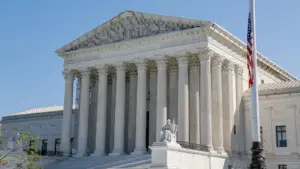The outcome of a significant case involving the St. Isidore of Seville Catholic Virtual School could redefine the boundaries between public education and religious institutions in the U.S., reflecting changes in the Supreme Court's ideological makeup since Trump's presidency.
Supreme Court Case Paves the Way for Religious Charter Schools

Supreme Court Case Paves the Way for Religious Charter Schools
A pivotal Supreme Court case could allow religious charter schools to receive public funding, challenging traditional secular education norms.
In a landmark legal confrontation, the U.S. Supreme Court is poised to reshape the landscape of education by potentially allowing publicly funded religious charter schools. This development, largely credited to the appointments made by former President Donald Trump, emerges from a case concerning the St. Isidore of Seville Catholic Virtual School. Oklahoma officials are advocating for the school, which aims to provide education rooted in Catholic values while adhering to all state academic requirements.
However, this initiative faces stiff opposition from various activist groups, including those aligned with the Biden administration, who assert that utilizing public funds for religious education contravenes constitutional mandates against the establishment of religion. At the heart of this debate is a judicial system, under the influence of a 6–3 conservative majority, that is now reconsidering long-standing interpretations that have barred faith-based schools from accessing public resources.
St. Isidore, a fully online Catholic charter, received approval from the state's virtual charter board in 2023. Yet, legal challenges surfaced almost instantly, led by opponents claiming that supporting such a religious institution with public funds constitutes an unconstitutional endorsement of a particular faith. Nevertheless, recent precedents like the 2020 Supreme Court ruling in Espinoza v. Montana Department of Revenue suggest that religious schools may soon have the same rights as their secular counterparts, especially when participation is voluntary.
Legal experts indicate that Trump-nominated Justices Gorsuch, Kavanaugh, and Barrett could prove crucial in this case, potentially paving the way for religious charter schools to partake in publicly funded programs. Advocates for this shift, such as Rep. Mark Green (R-TN), believe that the case represents a significant move towards restoring parental choice and reasserting the role of faith in education.
Despite opposition from the current administration, which supports maintaining clear distinctions between government funding and religious organizations, there is increasing grassroots support for religious charter schools, particularly among minority parents who feel underserved by existing educational options.
The discussion surrounding this case not only highlights the influence of Trump's judicial legacy but also reflects a broader cultural momentum toward embracing faith-based education as a legitimate option, allowing families to make choices that align with their values.




















